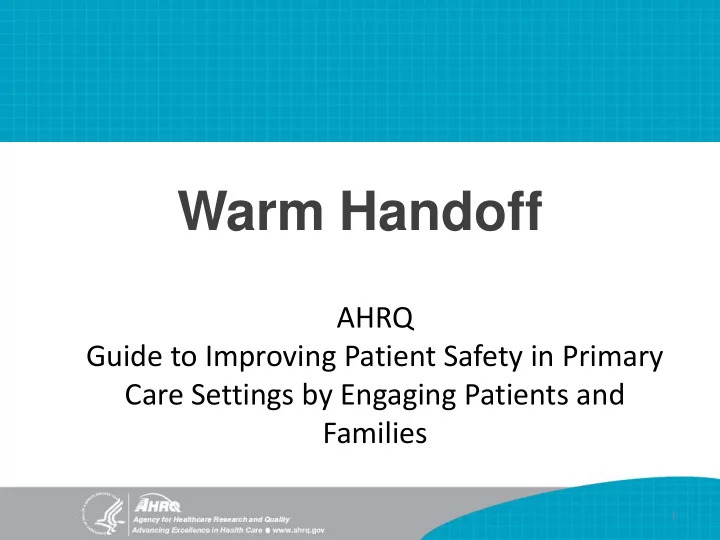

Warm Handoff AHRQ Guide to Improving Patient Safety in Primary Care Settings by Engaging Patients and Families 1
Speaker Kelly Smith, PhD Scientific Director, Quality & Safety Co-PI, AHRQ Guide to Improve Patient Safety in Primary Care Settings by Engaging Patients and Families kelly.m.smith@medstar.net No financial conflicts of interest to disclose. 2
Objectives • Review the key threats to patient safety in primary care settings and interventions to engage patients and families to improve safety • Describe the role and value of the Warm Handoff strategy in improving patient safety • Identify strategies for implementing the Warm Handoff strategy in primary care settings 3
Guide – Project Goals • Meaningful engagement with patients and families in ways that impact safety, not just quality • Based on evidence • Tools that are easy to use • Tools for practices who have not done much in this area 4
Key Project Deliverables • Environmental Scan • Four Case Studies of Exemplar Practices • Four Interventions to Improve Safety by PFE • Final Guide 5
Key Threats & Promising Interventions Promising Interventions Threats to Patient Safety • Breakdowns in • Shared Decisionmaking communication • Patient and Family Advisory • Medication management Councils (PFAC) • Diagnosis and treatment • Team-based Care • Fragmentation and • Medication Management environment of care • Family engagement in care • Structured communication tools 6
Patient & Family Engagement in Primary Care
Four Interventions • Teach-Back • Be Prepared to be Engaged • Medication Management • Warm Handoff 8
What is the Warm Handoff Strategy? • Strategy to encourage bi (or tri) directional communication with patients, family members and the care team • Moves conversations between healthcare team members in front of the patient • A safety check!
Why Use the Warm Handoff Strategy? • Communication breakdowns are a key threat to patient safety. • Miscommunication and omissions can lead to medical errors and adverse events. • Use warm handoffs to: – Increase patients’ understanding of the diagnosis and plan of care. – Engage all members in team-based care, including patients and families. – Validate and verify information exchanged. – Reduce breakdowns in communication. 10
When should a Warm Handoff be used? • After rooming patients • After the patient exam • Anytime during transitions in care such as with the – Scheduler – Lab technician – Nurse educator – Other team members 11
Getting Started • Identify a Champion and get Leadership Buy-in Step 1 • Develop processes for using Warm Handoff Step 2 • Train team members and initiate implementation Step 3 • Introduce the Warm Handoff to patients Step 4 Step 5 • Evaluate and refine 12
Step 1. Leadership Buy-in • Identify a Warm Handoff practice champion • Obtain leadership buy- in and support • Identify a process improvement team Engage a patient or two in developing your plan 13
Step 2. Design Implementation • Identify a team to help design processes for each of the Warm Handoff strategy tools • Identify resources for implementation 14
Step 3. Orient Practice Staff • Information about the Warm Handoff Strategy for: – Practice Staff – Clinicians • Provide overview of resources available and how to use Warm Handoff to enhance engagement 15
A Warm Handoff in Action https://www.youtube.com/watch?v=ZTL5ltGMUlQ&feature=youtu.be
Checklist for Staff • Checklist to help support adoption • Guides the elements of the conversation between the Clinician and Practice Staff • Asks the Patient to engage in the conversation
Clinician and Staff Handouts
Step 4. Orient Patients • Orient the patient to the Warm Handoff Strategy – Patient Fact Sheet • Discuss why it is important • Reinforce the need for patients to engage in discussions about their care 19
Step 5. Evaluate & Refine • Observations Refine Evaluate • Team debriefs Implement Design • Simple counts 20
How can the AHRQ PFE Guide help practices achieve success?
How Can I Get Started?
QUESTIONS? 23
Recommend
More recommend